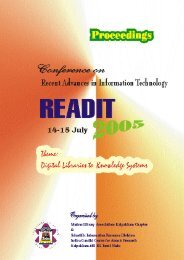READIT-2007 - Indira Gandhi Centre for Atomic Research
READIT-2007 - Indira Gandhi Centre for Atomic Research
READIT-2007 - Indira Gandhi Centre for Atomic Research
You also want an ePaper? Increase the reach of your titles
YUMPU automatically turns print PDFs into web optimized ePapers that Google loves.
4.18 Web jacking<br />
Forceful taking of the control of a web site by cracking the password, is termed as ‘web<br />
jacking’. In this case, actual owner of the website does not have any more control over what<br />
appears on that website.<br />
4.19 Phishing<br />
Phishing is the act of sending an email to a user falsely claiming to be an established<br />
legitimate business in an attempt to scam the user into surrendering private in<strong>for</strong>mation that will<br />
be used <strong>for</strong> identity theft. The email directs the user to visit a Web site where he or she is asked<br />
to update personal in<strong>for</strong>mation, such as passwords and credit card, social security, and bank<br />
account numbers, that the legitimate organization already has issued. The Web site, however, is<br />
bogus and set up only to steal the user’s in<strong>for</strong>mation. Phishing combines the power of the<br />
internet with universal human nature to defraud millions of people out of billions of dollars<br />
across the globe. It is very important to note that nearly every internet user has received a<br />
phishing email by now.<br />
5. CYBER CRIMINALS<br />
Any person who commits an illegal act with a guilty intention or commits a crime is<br />
called an offender or a criminal. In this context, any person who commits a Cyber Crime is<br />
known as a Cyber Criminal. It seems really difficult to believe but true that most of the amateur<br />
hackers and cyber criminals are teenagers in the age group of 9 to 16. To them, who have just<br />
begun to understand what appears to be a lot about computers, it is a matter of pride to have<br />
hacked into a computer system or a website. These young rebels may also commit cyber crimes<br />
without really knowing that they are doing anything wrong.<br />
Persons who hack web sites with political motive are known as Hacktivists. The attacks<br />
on approximately 200 prominent Indian websites by a group of hackers known as Pakistani<br />
Cyber Warriors are a good example of political hacktivists at work. Hacking of web sites with<br />
religious and social motive is also increasing across the globe. Sometimes displeased employees<br />
of an organization can be turned as hacker. Earlier they had the option of going on strike against<br />
their bosses. Now, with the increase independence on computers and the automation of<br />
processes, it is easier <strong>for</strong> disgruntled employees to do more harm to their employers by<br />
committing computer related crimes, which can bring entire systems down and cause heavy<br />
monetary loss. It is a well known secret that extensive computerization has resulted in business<br />
organizations storing all their in<strong>for</strong>mation in electronic <strong>for</strong>m. So, rival organizations employ<br />
hackers to steal industrial secrets and other in<strong>for</strong>mation that could be beneficial to them. The<br />
temptation to use professional hackers <strong>for</strong> industrial espionage also stems from the fact that<br />
physical presence required to gain access to important documents is rendered needless if hacking<br />
can retrieve those.<br />
6. INFORMATION TECHNOLOGY ACT 2000<br />
Realising the importance of the enactment of suitable Act to combat cyber crimes,<br />
the Government of India after careful consideration passed the In<strong>for</strong>mation Technology Act<br />
2000. But, experts felt that the IT Act, 2000, is primarily meant to be a legislation to promote e-<br />
138

















